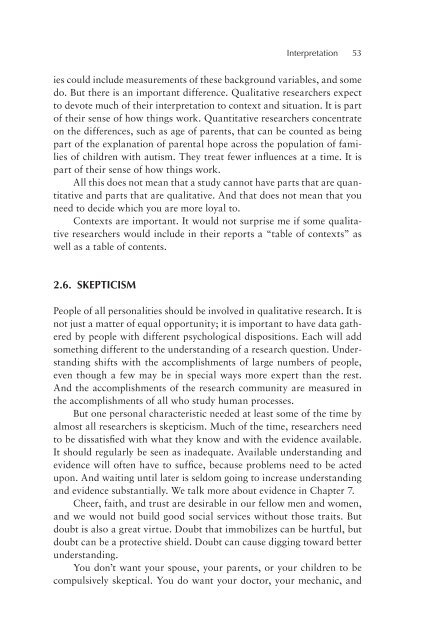How Things Work - Doha Academy of Tertiary Studies
How Things Work - Doha Academy of Tertiary Studies
How Things Work - Doha Academy of Tertiary Studies
Create successful ePaper yourself
Turn your PDF publications into a flip-book with our unique Google optimized e-Paper software.
Interpretation 53<br />
ies could include measurements <strong>of</strong> these background variables, and some<br />
do. But there is an important difference. Qualitative researchers expect<br />
to devote much <strong>of</strong> their interpretation to context and situation. It is part<br />
<strong>of</strong> their sense <strong>of</strong> how things work. Quantitative researchers concentrate<br />
on the differences, such as age <strong>of</strong> parents, that can be counted as being<br />
part <strong>of</strong> the explanation <strong>of</strong> parental hope across the population <strong>of</strong> families<br />
<strong>of</strong> children with autism. They treat fewer influences at a time. It is<br />
part <strong>of</strong> their sense <strong>of</strong> how things work.<br />
All this does not mean that a study cannot have parts that are quantitative<br />
and parts that are qualitative. And that does not mean that you<br />
need to decide which you are more loyal to.<br />
Contexts are important. It would not surprise me if some qualitative<br />
researchers would include in their reports a “table <strong>of</strong> contexts” as<br />
well as a table <strong>of</strong> contents.<br />
2.6. sKePticisM<br />
People <strong>of</strong> all personalities should be involved in qualitative research. It is<br />
not just a matter <strong>of</strong> equal opportunity; it is important to have data gathered<br />
by people with different psychological dispositions. Each will add<br />
something different to the understanding <strong>of</strong> a research question. Understanding<br />
shifts with the accomplishments <strong>of</strong> large numbers <strong>of</strong> people,<br />
even though a few may be in special ways more expert than the rest.<br />
And the accomplishments <strong>of</strong> the research community are measured in<br />
the accomplishments <strong>of</strong> all who study human processes.<br />
But one personal characteristic needed at least some <strong>of</strong> the time by<br />
almost all researchers is skepticism. Much <strong>of</strong> the time, researchers need<br />
to be dissatisfied with what they know and with the evidence available.<br />
It should regularly be seen as inadequate. Available understanding and<br />
evidence will <strong>of</strong>ten have to suffice, because problems need to be acted<br />
upon. And waiting until later is seldom going to increase understanding<br />
and evidence substantially. We talk more about evidence in Chapter 7.<br />
Cheer, faith, and trust are desirable in our fellow men and women,<br />
and we would not build good social services without those traits. But<br />
doubt is also a great virtue. Doubt that immobilizes can be hurtful, but<br />
doubt can be a protective shield. Doubt can cause digging toward better<br />
understanding.<br />
You don’t want your spouse, your parents, or your children to be<br />
compulsively skeptical. You do want your doctor, your mechanic, and

















